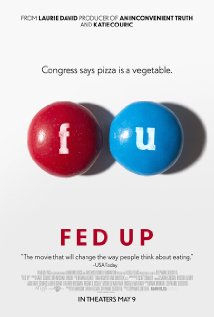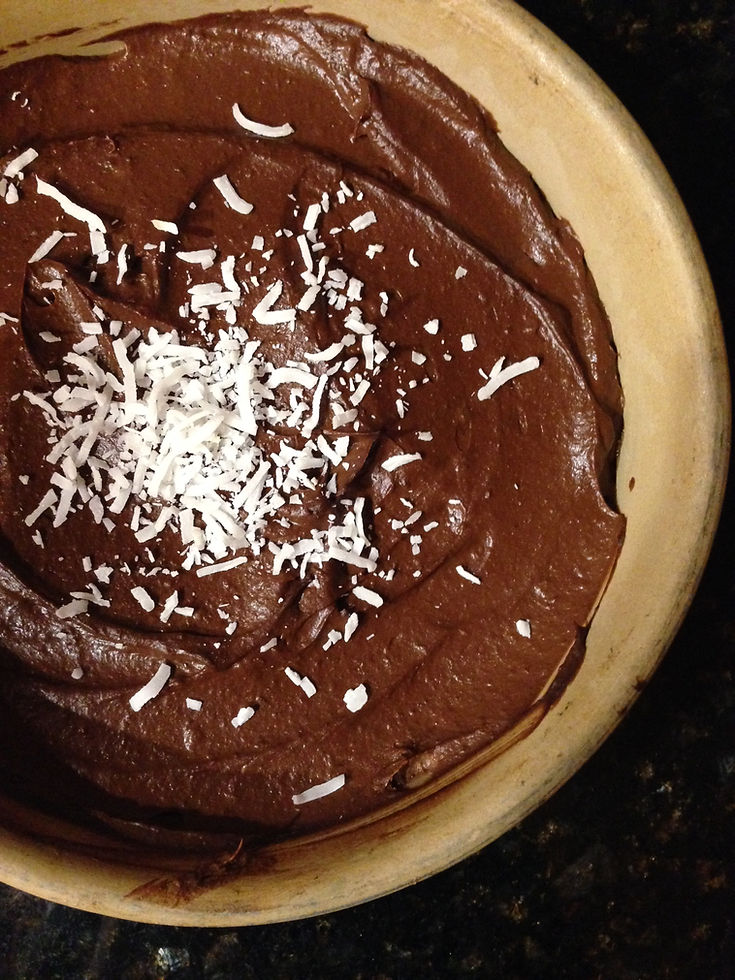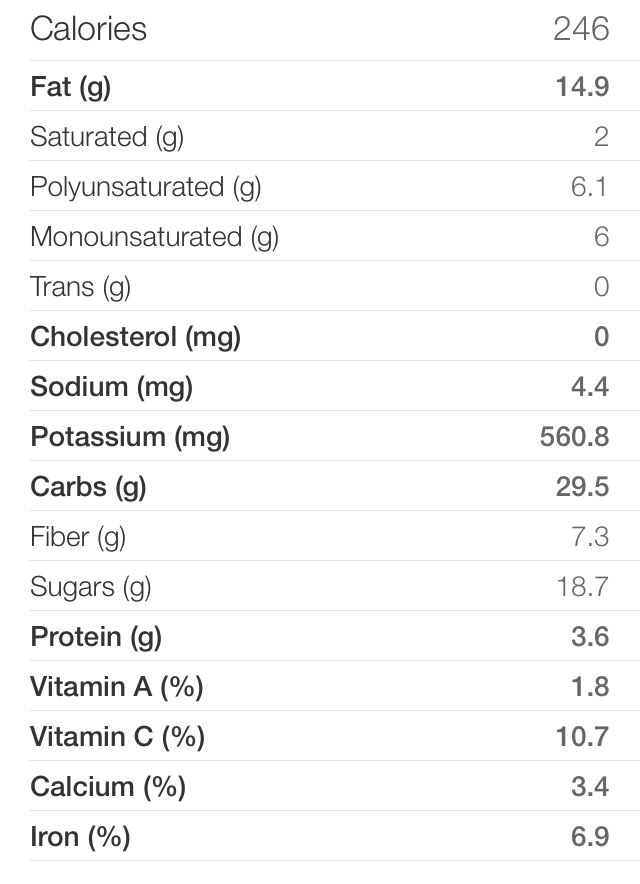I'm sorry I haven't posted in such a long time! The back-to-college transition always entails a rush of assignments and meetings, and I've been in the adjustment period for about a week now.

I have a whole host of recipes that I've cooked and have been meaning to post about, so I'll start with a requested dessert recipe.
I also wanted to talk a little bit about something that has come up in the news recently. A few weeks ago, my mom told me about a certain diet study that was funded by the NIH. My mom is a math teacher and I get my love of science and math from her, so our conversation was mostly analytical of the study's merit (rather, lack thereof). We were honestly confounded that the study had been deemed worthy of publishing, especially by such an established health organization as the National Institute of Health. And then a few days ago, as I continued to sit in my dry spell of blog post ideas, I came across an opinion piece in the New York Times by Gary Taubes that I think is too important not to share with anyone trying to live a little bit healthier. The article deals with the importance of hunger – sounds like a weird topic, right? Well, the article cites the study that my mom and I had discussed weeks ago, so we'll start with that study before delving into the key opinions espoused by Taubes.
The study looked at the effects of a low-carb diet versus a low-fat diet. There is a lot of history to this debate, but in essence (up until this study) the general consensus has been that a diet low in fat does not help people lose weight, and may generally do the opposite because a low-fat diet is often not satiating enough, and the dieter may eat extra empty (low nutrient) calories. The role of sugar in our diets today has been victimized as well, and, as sugar is a type of simple carb, carbohydrates have become the newly vilified macronutrient. If you're really interested in this, consider watching "Fed Up," which is a really well-made documentary about how our food consumption in the United States has changed (arguably for the worst) over the past few decades, as sugar and processed foods are continually overcoming the American diet.
One of the most important things I got from this documentary was the role of media and lobbyists (big name food corporations like soda companies, and the corn – think high fructose corn syrup – and sugar industries) in what we deem is healthy. I've talked a little bit about how fat was vilified in the past because of a faulty study, which launched the low-fat diet fad that lasted decades. Newer studies are generally coming to the consensus that sugar is the really problem – a concept we don't really like to believe, especially with the nominal connection between the fat we eat (lipids) and the fat we gain (body fat). Is fat making us fat? For the most part, it's pretty unlikely. Is sugar making us fat? Probably.

This gets even more confusing when we think about the fact that a gram of fat has 9 calories, while a gram of carbohydrates or protein has 4 calories, meaning if you each the same amount of fat in weight, you'll be eating more calories. This is partially what makes fat sating; if you eat a handful of nuts versus a cupcake, you'll feel fuller for longer with the nuts.
This is why we are still talking about which is better – low fat or low carb diets – today, years after we first began looking at the issue. The low fat proponents connect food fat (again, lipids) with body fat. Interestingly, as pointed out in "Fed Up," many of the studies that corroborate this diet are funded by big food corporations –again, sugar, soda, corn, etc. These proponents often try to shift the debate to a focus on exercise, placing the blame on the person who is simply not exercising enough– not trying hard enough– rather than admitting that their products are causing the health epidemic in America. The low carb proponents generally cite that fact that leftover carbohydrates in the body quickly become stored as fat when they aren't used for expending energy.
So this newest study apparently found, contrary to most everything else cited above, that the low-fat diet wins. Here is where my mom and I dissected the study itself, because it seems like no one took statistics into account in any way: the study was made up of 9 obese women and 10 obese men, hardly enough to make any type of claim about what type of diet is best for everyone! They were put on semi-starvation diets, basically reducing their calories by almost 1000 calories a day. One of the diets was considered low in carbs – 29% of the daily calorie intake, which could hardly be considered "low carb." The other diet was the fat-restricted diet, with 8% of the calories coming from fat. The worst part of this study, however, was the brevity of it: the subjects were kept on this diet for 6 days. So how strong are the claims that low fat is better? I think they are very, very weak, when all you look at is the experimental design of the study; our analysis didn't even touch on the actual results that came from the study, and how statistically significant (or insignificant) they are.
The real problem, however, is what made the news. If you hear that a study from a reputable source like the NIH found that low-fat diets help you lose more weight than low-carb, and this is all the information you have, why would you not believe it? This is why we have to be really careful when we introduce esoteric science and (hopefully) statistically sound studies into the realm of popular science, especially in the realm of nutrition and health where the effect of these studies is to make us healthier or sicker, to lengthen or shorten our lives.

The cool thing about the opinion piece by Taubes is that he considers how the study, and most "diet advice" studies, ignore hunger. Diets that simply restrict calories in some arbitrary fashion, which are often recommended to us, completely ignore the fact that being hungry is not a good thing. Not only is it bad for your physical health, as it puts your body in starvation mode making it harder to be healthy, it also affects your mental health. The opinion piece cites another study done a long time ago (when the ethical rules of studies were more lax): 26 men were fed extremely low-calorie diets to look at the effects of human starvation. There were obviously physical effects such as weight loss, but also "their extremities swelled; their hair fell out; their wounds healed slowly. They felt continually cold; their metabolism slowed." When dieting and health is discussed, often the role of hunger is considered trivial or a nonissue. But when we stop listening to our body's natural indications that we need something – whether it is depriving ourselves of sleep when our bodies are tired, forgetting to drink water when we are thirsty, or ignoring hunger pangs that tell us our body needs nutrients – we run the risk of developing unhealthy and unsustainable habits. As the article points out, hunger is far from a nonissue when dieting:
"More troubling were the psychological effects. The men became depressed, lethargic and irritable. They threw tantrums. They lost their libido. They thought obsessively about food, day and night. The Minnesota researchers called this 'semi-starvation neurosis.' Four developed 'character neurosis.' Two had breakdowns, one with 'weeping, talk of suicide and threats of violence.' He was committed to the psychiatric ward. The 'personality deterioration' of the other 'culminated in two attempts at self-mutilation.' He nearly detached the tip of one finger and later chopped off three with an ax."
What we eat has such a great effect on our mental health! Since this has been quite a long rant, I'll save my talk about the mind-gut connection for another day. (Essentially, what we eat greatly changes our mood, emotional state, stress levels, ability to cope… our health in every dimension.)
But I'll get off my soapbox now. Time for a recipe!

Now, this recipe is definitely a dessert recipe, but it incorporates healthy fats from avocado and walnuts, uses natural sugar (I know there is debate about this, since sugar is sugar, but in general the less refined the better), and gives you antioxidants from the cocoa powder, and vitamins and minerals from the banana (potassium, manganese, vitamin B, vitamin C…). Since it's a treat, use your willpower… although you may be tempted to eat the whole thing!
Chocolate Banana Pudding Pie
Ingredients:
Crust:
3/4 walnuts
8 medjool medjool
Filling:
2 avocados
1/4 cup Cocoa powder
12 dates soaked in coffee (or water), or 1/3 cup sugar
1 ripe banana
Directions:
Place the walnuts and dates (for crust) in a food processor. Blend until it makes a chunky dough.
2. Spray a pie pan with oil spray and press the dough into the pan for the crust. I used an 8 inch circular pie pan.
3. To make the filling, place the avocados, cocoa powder, soaked dates, and ripe banana in the food processor and process until smooth. Taste the filling and add more sugar or cocoa powder as desired. Spread the filling over the crust. If desired, top with whipped cream or shredded unsweetened coconut.
4. Refrigerate for at least 30 minutes. The pie will keep for about 2 days.



